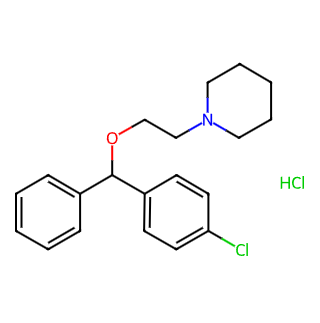- Synthetic anti-infective drugs
- Medications for the digestive system
- Antipyretic and analgesic drugs
- Medications for the blood system
- Medications for the respiratory system
- Anti-allergic drugs
- Medications for the urinary system
- Diagnostic medications
- Immunosuppressive and immunomodulatory drugs
- Vitamins and mineral supplements
- Antioxidants and medications for osteoporosis
- Antiparasitic drugs
- Ophthalmic medications
- Amino acids and their derivatives
- Dermatological medications
- Medications for the circulatory system
- Antitumor drugs
- Medications for the nervous system
- Hormonal and endocrine function-regulating drugs
- Antibiotics
- Others
CAS No.: 14984-68-0




Cloperastine Hydrochloride
Cloperastine Hydrochloride is a medication primarily used for its antitussive (cough-suppressing) effects. It is indicated for the treatment of frequent, dry, non-productive cough caused by various conditions.
Basic Information
Molecular Formula: C20H25Cl2NO
Molecular Weight: 366.33
CAS NO.: 14984-68-0
English Name: Cloperastine Hydrochloride
Pharmacological Actions
Cloperastine Hydrochloride exerts its effects through multiple pharmacological mechanisms, including:
Sedative Effect: It inhibits central nervous system excitability, reducing overactive nerve transmission, thereby producing a sedative effect.
Analgesic Effect: By blocking P-substance receptors in the nerve transmission pathway, it reduces pain signals triggered by nociceptor stimulation.
Antipyretic Effect: It mildly inhibits the thermoregulatory center, lowering the set-point during fever, resulting in heat dissipation exceeding heat production, thus reducing fever.
Antihistamine Effect: It competitively occupies histamine H1 receptors, preventing histamine stimulation of target cells like mast cells and eosinophils, thereby alleviating allergic reaction symptoms.
Anticholinergic Effect: It reversibly inhibits acetylcholinesterase activity, increasing acetylcholine concentrations in the body, leading to enhanced M-cholinergic receptor-mediated physiological effects such as glandular secretion inhibition, mydriasis, and heart rate reduction.
Clinical Applications
Cloperastine Hydrochloride is primarily used to treat frequent non-productive dry cough caused by acute upper respiratory infections, chronic bronchitis, tuberculosis, lung cancer, and other conditions. As a cough suppressant, it effectively inhibits the cough center and has H1 receptor blocking activity, which can mildly relieve bronchial spasms, congestion, and edema, relaxing peripheral bronchial smooth muscle, thereby aiding in cough suppression.

Tai Yau Street, San Po Kong, Kowloon, Hong Kong, China.



